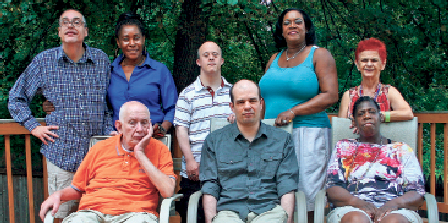
At first glance, the Village of Thomaston home at 21 Linden Street is barely distinguishable from the rest of it neighboring residences.
But for the developmentally disabled adults who have lived in what is known as “The Thomaston House” for the past 30 years, their home is anything but ordinary.
The Thomaston House is one of 29 residences for developmentally disabled adults located across Nassau and Suffolk counties, which are sponsored by the nonprofit organization Adults & Children with Learning and Developmental Disabilities Inc.
“It’s a tremendous value to the community,” ACLD Director of Residential Services Joe Bianca said of The Thomaston House. “If it wasn’t for programs like Thomaston, these individuals would have no place to live or interact with other people in the community.”
Through daily programs and care received at The Thomaston House, the seven developmentally disabled adults currently living at the home receive critical medical and emotional support to allow for a normal life, said longtime Great Neck resident and activist Sheila Penn, who is the president and a founding member of the Foundation of Community Unified Services Inc.
“It’s wonderful,” Penn said of The Thomaston House. “I get so much pleasure from doing something here. They are all very nice.”
Since it opened in May of 1982, the Thomaston House has provided a safe haven for many developmentally disabled adults, Bianca said.
Along with The Thomaston House, the ACLD operates two similar homes in Great Neck on Old Mill Road and in Russell Gardens.
The homes on Old Mill Road and in Russell Gardens have a capacity for 12 residents, while The Thomaston House can hold up to eight occupants, Bianca said.
“We provide support and service to people with disabilities, so they can provide a more independent life in the community,” he said of the ACLD sponsored residences.
Aside from receiving medical care and housing at the ACLD-sposnored homes, Bianca said the residents get the chance to “integrate themselves into the whole fabric of what’s going on in the community.”
For Maryse Chavannes, a staff member at The Thomaston House, that opportunity is a wonderful thing for the men and women she has cared for over the past five years.
“They are well taken care of,” Chavannes said. “The staff are taking care of them very well. They respect each other and everybody loves each other and treats them like their own.”
The Thomaston House employs 14 staff members who care for the home’s residents 24 hours a day and seven days a week, Chavannes said.
“They are direct support professionals,” Bianca said of the Thomaston House employees. “They have a minimum of a high school diploma, plus training in other areas.”
Bianca said the Thomaston House staff members are among the best who operate the ACLD’s homes across Nassau and Suffolk counties.
“They’re very good,” Bianca said. “They do a wonderful job. They have (the residents) actively involved in the community.”
Each weekday, residents living in the Thomaston House take part in a program which they work and volunteer in various capacities throughout Great Neck, Penn said
“By law, they have to be out of the house and at a program,” she said.
The Thomaston House manager Jane Nnami said the work-related programs keep her residents quite busy.
“Some of them leave at like seven, eight and they go to the program in the morning, five days a week,” Nnami said.
When the residents return each evening, they have dinner and take part in a variety of activities from going to local parks, to shopping or watching movies at a local theater, Nnami said.
“They are always doing something,” Nnami said of The Thomaston House’s residents who range anywhere from 30 to 70 years of age.
That includes going on a yearly vacation.
Later this month, The Thomaston House’s seven residents and staff members will be going on a five-day vacation to Lake George in Upstate New York.
“The sponsor of (The Thomaston House) is a first-class outfit,” Village of Thomaston Mayor Robert Stern said. “They operate a very nice installation on Linden Street. We respect the work they do. We cooperate with them in every way we can.”
But for Penn, The Thomaston House is in dire need of more involvement from the community.
A native of England, Penn and her family moved from Brooklyn to Great Neck in 1970 because of the educational opportunities the peninsula’s schools offered for her developmentally disabled second child, Steven.
In 1988, Penn helped establish the Foundation of Community Unified Services Inc. (FOCUS), which was created by a group of parents of handicapped children.
With her long standing connection to local community leaders, ACLD Executive Director Aaron Liebowitz recently asked FOCUS to help The Thomaston House become even more involved in Great Neck, Penn said.
“No one knew they were here,” Penn said of The Thomaston House. “They were (30) years here, no one knew they were here.”
Penn said many of The Thomaston House’s residents have been abandoned by their families. She said two of the home’s current residents also previously lived in the Willowbrook State School on Staten Island.
The Willowbrook State School was closed in 1987 after it was found in the early 1970s to be housing 6,000 developmentally disabled people of all ages in abusive conditions.
Then Sen. Robert Kennedy called Willowbrook l “a snake pit” and reporter Geraldo Rivera won a Peabody Award for his documentary called “Willowbrook: The Last Great Disgrace.”
Rivera’s documentary led to a government inquiry, which ultimately resulted in Willowbrook’s closing.
Although Willowbrook has been closed for decades, the facility’s story serves as a reminder of just how important the services provided at The Thomaston House are, Penn said.
“This is like heaven for them,” she said of The Thomaston House. “I’d like to see the community more involved, to know they’re here.”






